#Bazin
Explore tagged Tumblr posts
Text

Renowned film critic André Bazin with cat friend, 1950. Source.
1K notes
·
View notes
Text
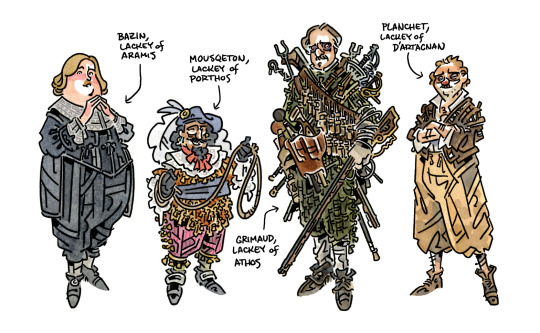
Adding to the THREE MUSKETEERS collection I'm working up (building on the existing lead character drawings); the lackeys! Pious Bazin, daredevilish Mousqeton, stoic Grimaud, and crafty Planchet.
#Three Musketeers#The Three Musketeers#Alexandre Dumas#Musketeers#Planchet#Mousqeton#Bazin#Grimaud#Musketeers Fan Art#Three Musketeers Fanart
213 notes
·
View notes
Text

"François Truffaut, le Scénario de ma Vie" documentaire de David Teboul sur le réalisateur François Truffaut (1932-1984), décembre 2024.
#films#hommage#Teboul#Truffaut#Morgenstern#Montferrand#Bazin#Genet#Roche#Hessel#Levy#Scott#Moreau#Ardant#Deneuve#Leaud#Speilberg
2 notes
·
View notes
Text
all i need rn is gold, bazin and a tiny bit of love
0 notes
Text
BAZINUL DE ÎNOT DIN ONEȘTI INTRĂ ÎN LINIE DREAPTĂ
BAZINUL DE ÎNOT DIN ONEȘTI INTRĂ ÎN LINIE DREAPTĂ Municipiul Onești se pregătește să își îmbogățească infrastructura sportivă cu un nou bazin de înot acoperit, destinat atât activităților didactice, cât și celor de agrement. Proiectul, în valoare de 4.000.000 euro plus TVA, este finanțat de Compania Națională de Investiții (CNI) și a intrat deja în faza de licitație. Finanțare CNI CNI a demarat…
0 notes
Text

Daney on Bazin and cinema's disappearance/realisation
1 note
·
View note
Text
"Hence the charm of family albums. Those grey or sepia shadows, phantomlike and almost undecipherable, are no longer traditional family portraits but rather the disturbing presence of lives halted at a set moment in their duration, freed from their destiny; not, however, by the prestige of art but by the power of an impassive mechanical process: for photography does not create eternity, as art does, it embalms time, rescuing it simply from its proper corruption." –– A. Bazin
0 notes
Text
Přišel den D

180 notes
·
View notes
Text
since today is punctuation day, i figured i'd talk with you about my favorite punctuation that is sadly not in unicode






(my apologies if these crop weird)
these six marks were invented by french writer hervé bazin in his essay plumons l'oiseau (or 'let's pluck the bird')
while the essay also had aim to switch the french language to a more phonetic writing system, it also gave us six new punctuation marks!
from left to right and top to bottom these are, the acclamation point, the authority mark, the conviction point, the doubt point, the irony mark, and the love point. so let's go over what these all were supposed to convey! (or at least what i expect they were supposed to)
the acclamation point was meant for praise, goodwill, and enthusiasm (ie "Well done [acclamation point]")
the authority mark was meant to be used in situations where the exclamation was serious and involved a degree of command or urgency (ie "Get in my office right now [authority mark]") i think this— along with the love point and irony mark— shows how a lot of these punctuation marks were a bit like early examples of tone tags, i'll get into it more later
the certitude point was used to show sureness in a fact. (ie "It's absolutely positively true [certitude point]") i think this might be the most useless of the bunch but whatever. i digress.
the doubt point is kind of the opposite of the certitude point, used when you aren't sure of something (ie "It should be done tomorrow [doubt point]") also it should be noted that the example used above is not the only way you'll see the doubt point, some also have it looking like this
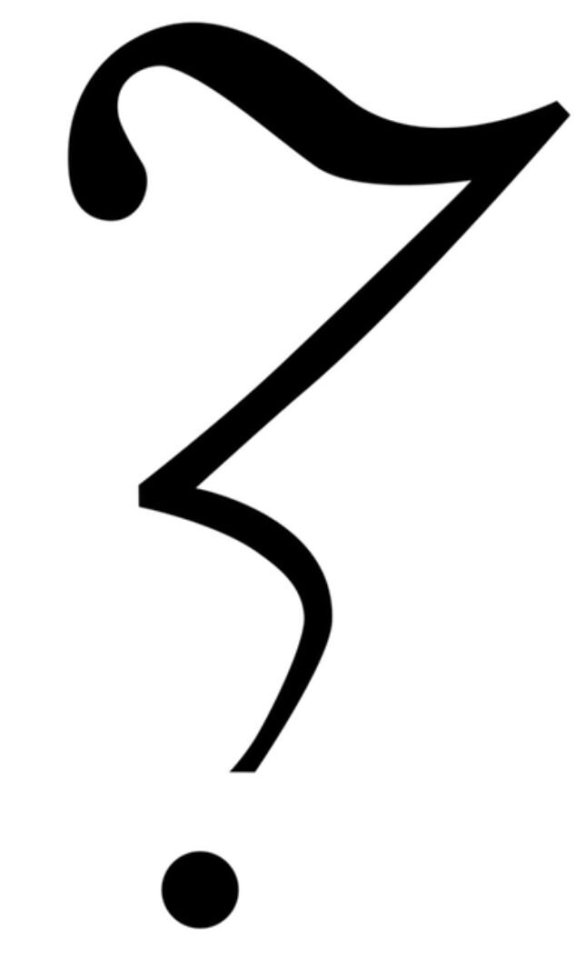
the idea of irony marks has been widely suggested, for example the poet/art critic/song writer (i think, this guy's only wiki page is in french and i am guessing a bit on the word 'chansonnier') alcanter de brahm suggested an irony mark that resembled a backwards question mark (not to be confused with the percontation point which indicated a rhetorical question) and belgian inventor (among other things) marcellin jobard suggested a point that looked like an upwards arrow (this △ on top of this |, i can't paste it)

^ de brahm's mark
all that to say, bazin's mark was based off of the greek letter psi (Ψ) which some of you may recognize if you are familiar with the greek language or comics that shall not be named. it's used in situations of irony (ie saying "Wow, that sure was brilliant [irony mark]" if someone did something stupid)
and our last point is the love point, known for being so adorable, and indicating love or affection after a sentence (ie "Thanks a lot bud [love point]")
now we can obviously see that some of these are very similar to tone tags! the love point could be like a /pos, the irony mark is kinda like a /sarc, the authority mark could be like a /srs . i just thought it was interesting i guess. i don't have a point (heh) here exactly except that i guess people might actually need these punctuation marks ? so unicode? give me the love point or give me death
anyways so that's some fun niche history for y'all! hope you enjoyed
#punctuation#not counting#i mean i know there's like. things you can use but i don't like them as much#side note. why are all of these people french. bazin was french. de brahm was french. jobard was belgian but he was born in french afaik#and belgium is a francophone country... is there something about the french language that makes everyone start just making new punctuation#i mean to be fair i am in french and i did try to remake the entire language with like seven grammatical genders#so maybe it's just a thing#punctuation day
1K notes
·
View notes
Text
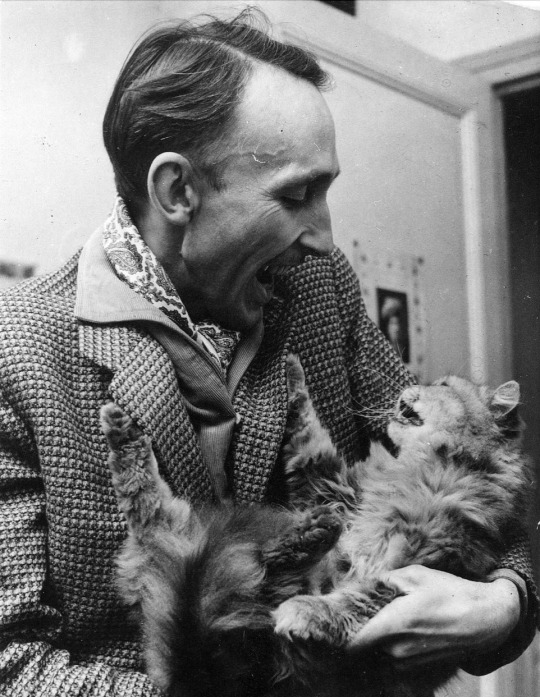
Renowned film critic André Bazin with cat friend. Source.
770 notes
·
View notes
Text

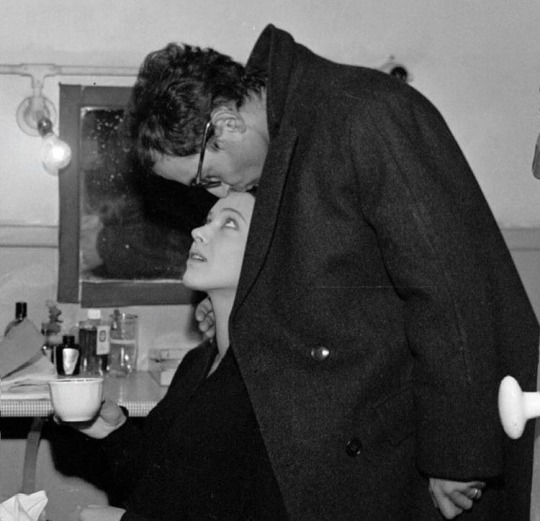


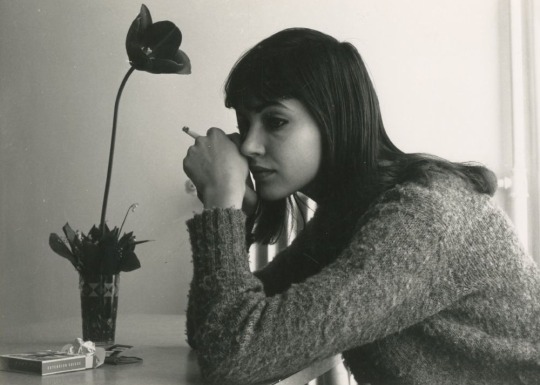

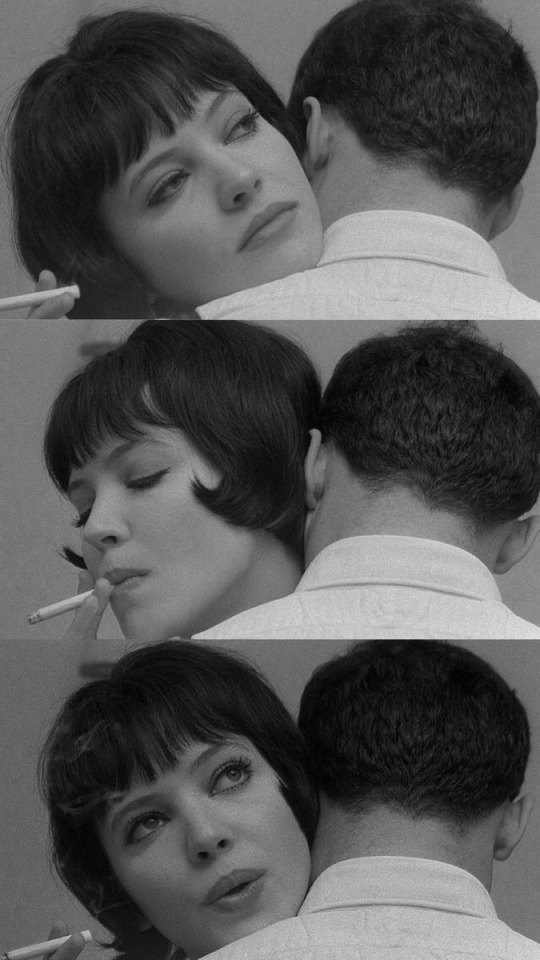
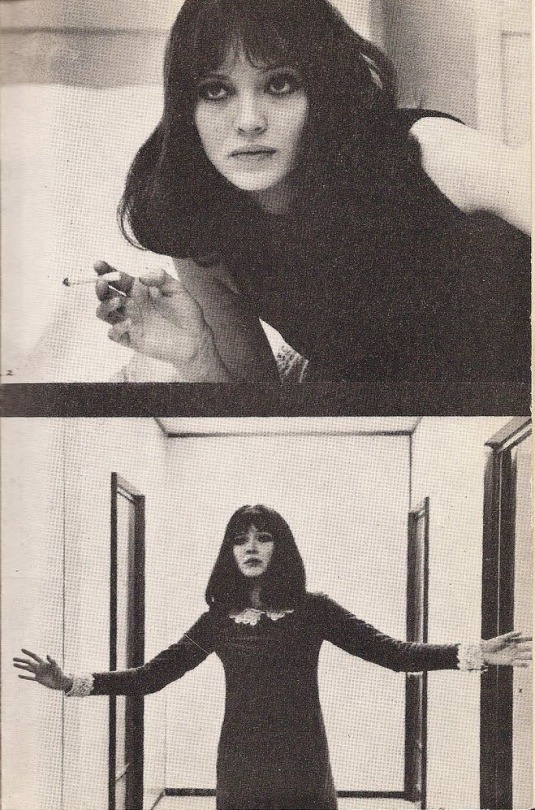

Anna Karina. Muse of the cult director of the new wave Jean-Luc Godard.
Photos from different years
#anna karina#jean luc godard#actor#film#art#movies#photography#magazine#french#french new wave#cinema#cahiers du Cinema#andre bazin#jean luc godard films#cinemetography#cinephile#french film#50s movies#60s fashion#60s film#black and white aesthetic#love
50 notes
·
View notes
Text
tbh if ur interested in screen studies at all and havent read any bazin.... fix that shit ASAPPPP here are links to what is cinema 1 and what is cinema 2 NO EXCUSES
11 notes
·
View notes
Text





iwtv 2.02 ‘do you know what it means to be loved by death’ / andré bazin ‘ontology of the photographic image’
#it’s a reduction 🕺🕺#so when is louis gonna meet bazin#iwtv#iwtv spoilers#does this count as revision#😔😔😔
28 notes
·
View notes
Text
This broke my heart. This is honestly where I started ugly-crying. As you can probably tell by my viewing habits, an angst junkie like myself has a super high tolerance for this sort of thing, but I think what got me was that they gave up, they were out, they were finally going to be free and happy and then...


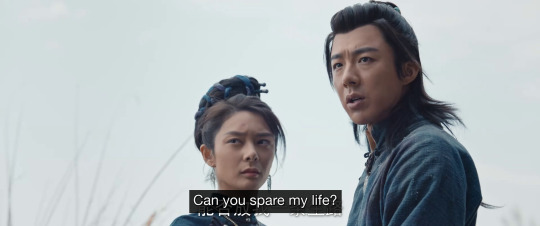
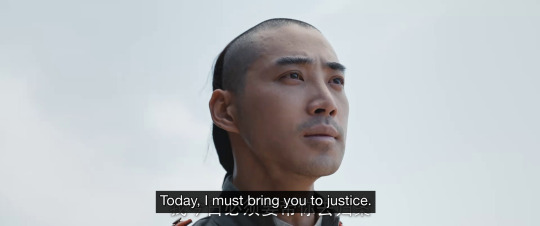
Jialuo has utterly lost it - when I commented that he was Qing Javert, I was more accurate than I thought. And the thing is, perhaps Bufan couldn't have won against the squad with guns, but if he wasn't badly wounded and had his weapon, maybe there was a small chance. But as is, there is none, and Jialuo's crowning achievement ends up being gunning down an unarmed, severely injured man and a woman whose only crime was refusing to leave his side.
Huo Qin tries to explain that Bufan didn't do any of the murders himself etc but Jialuo's has lost his marbles so much they are in Australia somewhere and is of course not listening.
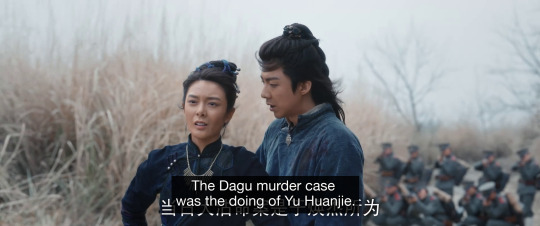

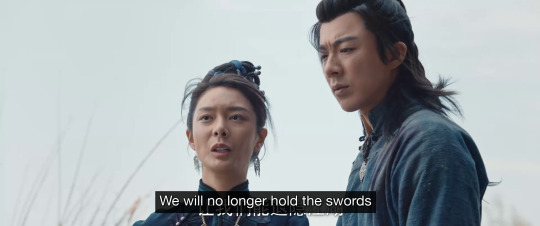
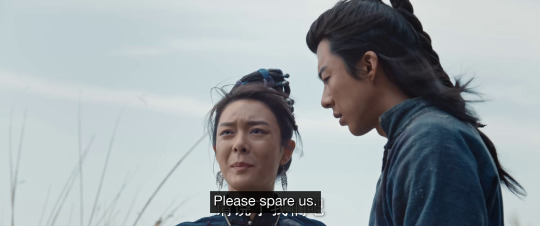
When she kneels I about lost it and the way Bufan kneels to lift her up because he won't have her kneel and also he knows it's pointless (side note - it kills me that from the moment he gave up on the sect, he's been calling her by her name, the way he didn't do the entire drama because of their respective positions.)
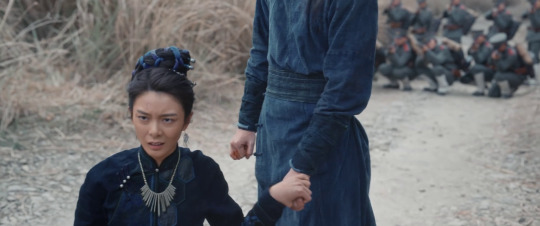
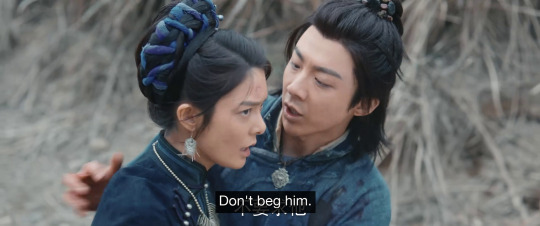
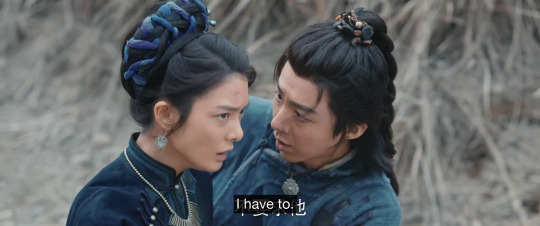
The way he wants to save her! He's accepted he's dead but he wants her to live.
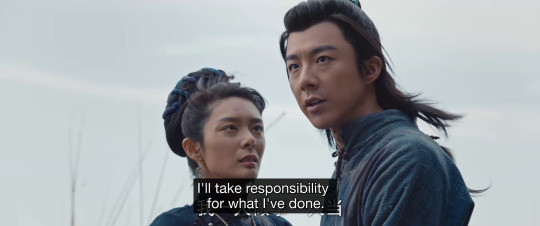
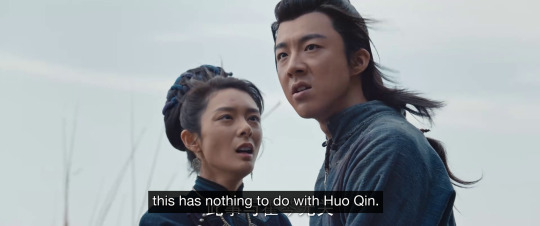
Except Jialuo is all "sure fine if she walks away, if not it's an executable offense so I am gonna kill her too." Man is Javerting to his full capacity.
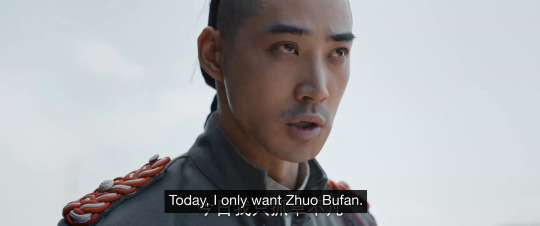
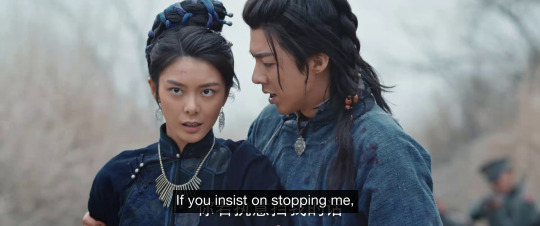
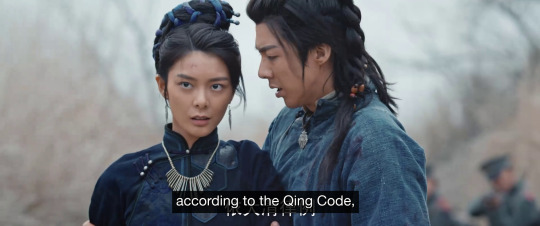
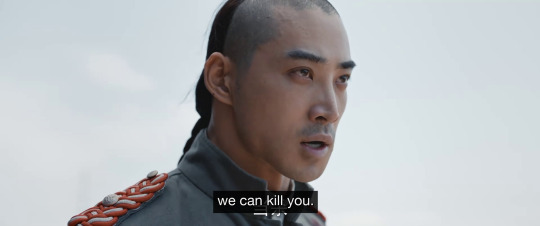
Indeed.
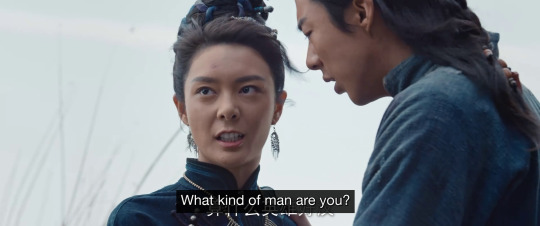
But she won't leave him.

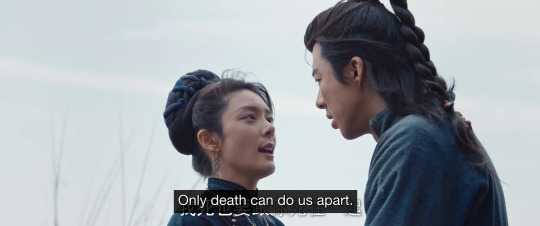
The way he just walks away and Bufan tries the last ditch effort to have her leave.
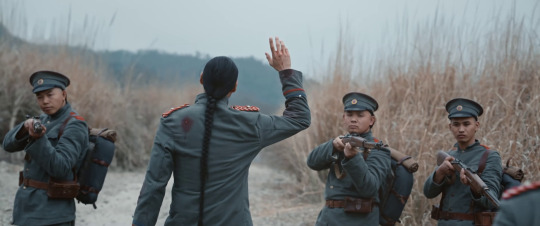
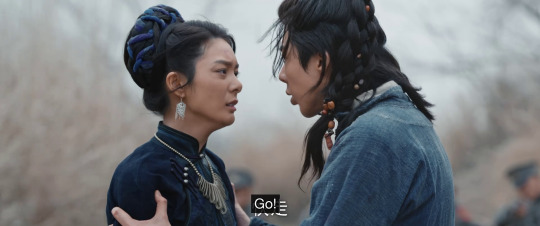
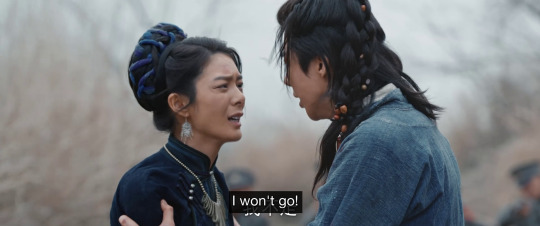
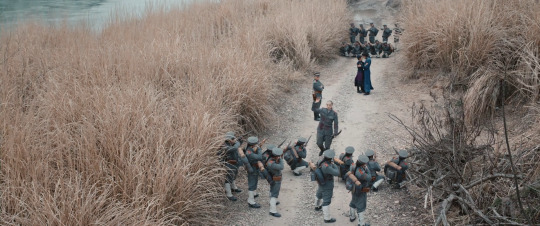
And he finally accepts...
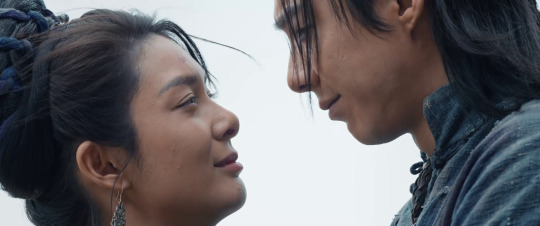
But the way he still tries to cover her tho it's futile...
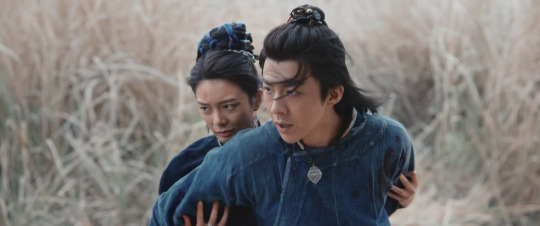
And we end on shots and birds flying...
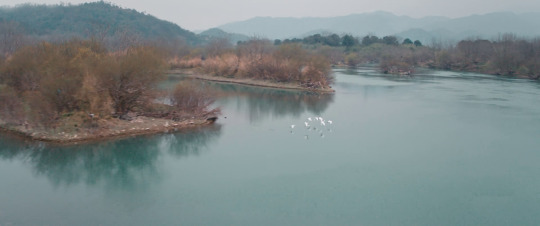
The overlap between people who've watched this drama and read Herve Bazin's Un feu dévore un autre feu is solely me but this made me remember Manuel and Maria's execution scene that ends that novel - the woman refusing to leave the man about to be executed despite his pleas and the soldiers going oh well then we will kill them both and the birds. I don't read French and can't find the quote in French anyway, but this is how the novel ends in Russian translation:
— Нет! — кричит Мануэль.
Она подъезжает, соскакивает на ходу, велосипед ударяется о ствол дерева, и еще долго вертится вхолостую колесо и слышится заунывная песенка втулки. Я подарил тебе жизнь, ты даришь мне свою смерть — какая нелепица! Сделать все, чтобы этого избежать, и по странному стечению обстоятельств познать всю полноту счастья, познать минуту, ради которой стоило жить, и сознавать, что она последняя, — какая нелепица! Но это прекрасно! Мария лишь мимоходом бросила безразличный взгляд на машину. Она села на край скамейки, взяла руку Мануэля.
— Приподними меня, если можешь, — шепчет он.
Ветер, воспользовавшись долгим молчанием людей, отгоняет подальше пыль. Сержант звонит еще раз, рапортует. Наконец, откашлявшись, говорит хрипло:
— Вы меня как следует поняли? Они пытаются бежать. Мы вынуждены применить оружие.
— А девчонка? — спрашивает шофер.
— Что поделать! Она его сообщница, а мертвые молчат. Даже женщины.
Мануэль поднялся. Мария плечом подпирает его, чтобы он снова не упал. Щека к щеке, они закрывают глаза: то, что происходит перед ними, обоих больше не интересует. Мария так и не произнесла ни слова, только губы ее шевелятся. Сейчас из конца в конец площади прокатится эхо, кое-где задребезжат оконные стекла, и птицы вновь взовьются в серое предрассветное небо, продырявленное чередой вспышек.
That novel was one of formative novels of my teen years so this scene in the drama just went straight to my id in the most eviscerating way.
22 notes
·
View notes
Text

ꜰɪᴀᴛ ʟᴜx ɪʟʟᴜꜱᴛʀᴀᴛɪᴏɴ'ꜱ 💕 •⊹٭𝟸𝟶𝟸𝟻 𝚅𝚊𝚕𝚎𝚗𝚝𝚒𝚗𝚎𝚜٭⊹•
Created with Procreate
𝙵𝚒𝚊𝚝 𝙻𝚞𝚡 𝙸𝚕𝚕𝚞𝚜𝚝𝚛𝚊𝚝𝚒𝚘𝚗 - visit the Digital Etsy shop to follow our account to get an alert when new valentines are uploaded!
| Visit InPrnt | Visit Etsy | Visit Digital Etsy | Visit Patreon | Visit the Portfolio |
#valentines#valentines day#star wars valentine#star wars valentines#valentines 2025#2025 valentines#star wars#star wars fanart#star wars art#star wars girl#star wars illustration#artblr#starwarsblr#star wars geek#star wars fan#Star Wars Nerd#pink art#lucasfilm#digital art#artists of tumblr#tumblr art#Tumblr Artist#star wars love#star wars ships#romance#romantic#fiatluxillustration#bazine netal#bounty hunter#bounty hunters
7 notes
·
View notes
Text

I recently became aware of a whole bunch of obscure punctuation marks that I never knew existed. As a result of this discovery, I’ve created a series of images that honor these obscure punctuation marks. This is another in the series. Not sure anyone will ever actually use these punctuation marks but you could try to adding them in as part of your social media dating app profile. Who knows, you might get lucky.
The "Irony Mark" is a punctuation mark designed to indicate a hidden subtext or ironic meaning in a sentence. It's meant to help readers understand that the text may be sarcastic, cynical, or expressing a subtext that is different from what the words explicitly say. The mark typically precedes the sentence to which it applies.
You can certainly try using it nowadays but the irony would be..... very few would understand what you’re talking about. But…. you would. And really, that’s all that matters.
Original Digital Art ©2025 Bug Barians Ltd., LLC
#digital art digitalart#modern art#artists on tumblr#artist#art#visual art#my art#punctuation#punctuation marks#punctuation art#obscure punctuation#irony#irony mark#Herve Bazin#Monte Burke#Forged Art
5 notes
·
View notes